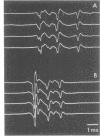Abstract
A method is described for repetitive stimulation studies in myasthenia gravis using submaximal stimulation and single muscle fibre recording techniques. It was found that there were no impulse blockings due to neuromuscular transmission factors in normal subjects with 2 Hz stimulation, although there was a decrease or increase in the number of potentials which was caused by axonal stimulation factors. In myasthenia gravis a pathological picture was obtained, consisting of impulse blockings and facilitation at this rate in all of the eight patients studied, even those with only the ocular form of myasthenia and without surface decrement in the ADM. This technique allows study of both the minimally involved motor endplates and those with pronounced neuromuscular disturbances.
Full text
PDF




Images in this article
Selected References
These references are in PubMed. This may not be the complete list of references from this article.
- EKSTEDT J. HUMAN SINGLE MUSCLE FIBER ACTION POTENTIALS. EXTRACELLULAR RECORDING DURING VOLUNTARY AND CHEMICAL ACTIVATION. WITH SOME COMMENTS ON END-PLATE PHYSIOLOGY AND ON THE FIBER ARRANGEMENT OF THE MOTOR UNIT. Acta Physiol Scand Suppl. 1964:SUPPL 226–226:1+. [PubMed] [Google Scholar]
- ELMQVIST D., HOFMANN W. W., KUGELBERG J., QUASTEL D. M. AN ELECTROPHYSIOLOGICAL INVESTIGATION OF NEUROMUSCULAR TRANSMISSION IN MYASTHENIA GRAVIS. J Physiol. 1964 Nov;174:417–434. doi: 10.1113/jphysiol.1964.sp007495. [DOI] [PMC free article] [PubMed] [Google Scholar]
- Stålberg E., Ekstedt J., Broman A. Neuromuscular transmission in myasthenia gravis studied with single fibre electromyography. J Neurol Neurosurg Psychiatry. 1974 May;37(5):540–547. doi: 10.1136/jnnp.37.5.540. [DOI] [PMC free article] [PubMed] [Google Scholar]





